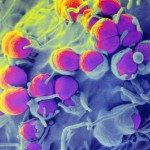Link to Pubmed [PMID] – 7525391
Dev. Biol. Stand. 1994;82:193-9
Extensive work is being performed to develop live recombinant bacterial vaccines. The use of non-pathogenic bacteria or attenuated strains derived from pathogens may allow protection against the pathogen and at the same time induce immunity against one or several foreign antigens expressed by the recombinant micro-organism. Several bacteria such as attenuated Salmonella or BCG have been used successfully in several experimental models to induce protective immune responses against several pathogens. However, the presentation to the immune system of a foreign antigen in a context different from the natural one may greatly modify the characteristics of elicited immune responses. It is therefore of the utmost importance to establish rules concerning the influence of the vector on the immunogenicity of recombinant antigens. Using a bacterial system that allows the expression of genetically engineered hybrid proteins, we have analysed: 1) the role of the molecular environment on the immunogenicity of foreign B- or T-cell epitopes; 2) the influence of the cellular location of a foreign B-cell epitope on the induction of specific immune responses; 3) the role of the bacterial vector (E. coli or Salmonella typhimurium) on the isotypic characteristic of antibody responses induced against the recombinant antigen. These studies revealed the complexity of the mechanisms which control the immunogenicity of foreign B- or T-cell epitopes expressed by recombinant vectors.
